Eyes Eyes Baby: Maha Morley-Kirk
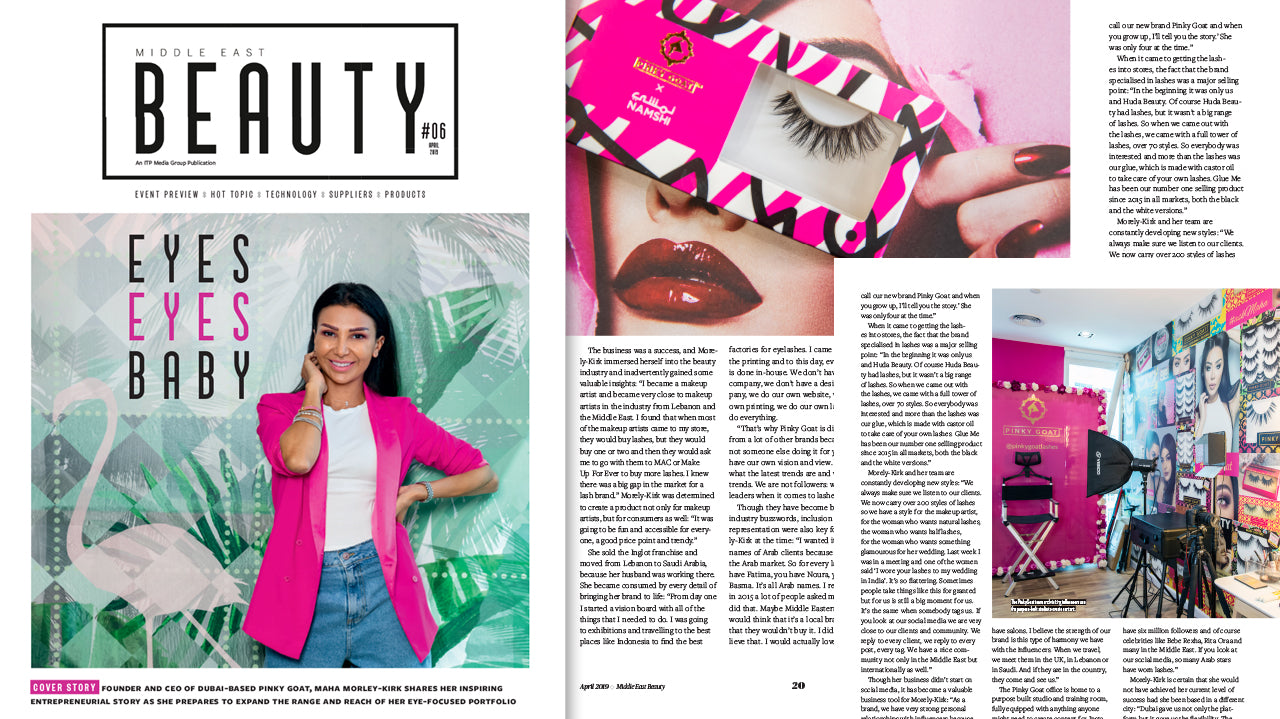
Her office walls may be covered in hot pink and she may have some of the region’s most high-profile influencers on speed dial, but Maha Morley-Kirk isn’t an ‘Instapreneur’; she’s an astute business woman with decades of industry experience under her belt. Morley-Kirk’s first foray into fashion was in Kuwait: “I left Lebanon when I was 17 and moved to Kuwait to work in fashion. I worked with M.H. Alshaya Co. for 11 years and by the end I was head of VM at H&M, so all my background is in fashion.”
A move to Warsaw, Poland with her husband was the catalyst for a career change. She explains: “We lived in Warsaw for three years and while I was there, I moved into the beauty industry. I was living in the same street where all the Inglot makeup stores were. Inglot is a Polish brand and this is when I started to dig deep and I found out that nobody had Inglot in Lebanon. That’s where all the makeup artists are.” Six months later, with the help of her husband, Morley-Kirk opened an Inglot franchise in Lebanon.
The business was a success, and Morley-Kirk immersed herself into the beauty industry and inadvertently gained some valuable insights: “I became a makeup artist and became very close to makeup artists in the industry from Lebanon and the Middle East. I found that when most of the makeup artists came to my store, they would buy lashes, but they would buy one or two and then they would ask me to go with them to MAC or Make Up For Ever to buy more lashes. I knew there was a big gap in the market for a lash brand.” Morley-Kirk was determined to create a product not only for makeup artists, but for consumers as well: “It was going to be fun and accessible for everyone, a good price point and trendy.”

She sold the Inglot franchise and moved from Lebanon to Saudi Arabia, because her husband was working there. She became consumed by every detail of bringing her brand to life: “From day one I started a vision board with all of the things that I needed to do. I was going to exhibitions and travelling to the best places like Indonesia to find the best factories for eyelashes. I came up with the printing and to this day, everything is done in-house. We don’t have a PR company, we don’t have a design company, we do our own website, we do our own printing, we do our own lashes. We do everything.
We know what the latest trends are and we create trends. We are not followers: we are leaders when it comes to lashes.“That’s why Pinky Goat is different from a lot of other brands because it’s not someone else doing it for us. We have our own vision and view. We know what the latest trends are and we create trends. We are not followers: we are leaders when it comes to lashes.”
Though they have become beauty industry buzzwords, inclusion and representation were also key for Morley-Kirk at the time: “I wanted it to have names of Arab clients because we are in the Arab market. So for every lash you have Fatima, you have Noura, you have Basma. It’s all Arab names. I remember in 2015 a lot of people asked me why I did that. Maybe Middle Eastern people would think that it’s a local brand and that they wouldn’t buy it. I didn’t believe that. I would actually love to find a product with my name. Now our clients are involved in our naming process. All of the inspiration comes from our Arabic clients.”
While the name of her brand isn’t Arab, it’s personal: “I wanted something different, something unique and also something that I could relate to. When I was brainstorming I put some colours including pink on the board. I love pink. A couple of days later, my daughter came in crying that she had lost her pink goat which I gave her when she was born. I promised her, ‘If we don’t find it, we will call our new brand Pinky Goat and when you grow up, I’ll tell you the story.’ She was only four at the time.”
When it came to getting the lashes into stores, the fact that the brand specialised in lashes was a major selling point: “In the beginning it was only us and Huda Beauty. Of course Huda Beauty had lashes, but it wasn’t a big range of lashes. So when we came out with the lashes, we came with a full tower of lashes, over 70 styles. So everybody was interested and more than the lashes was our glue, which is made with castor oil to take care of your own lashes. GlueMe has been our number one selling product since 2015 in all markets, both the black and the white versions.”
If you look at our social media we are very close to our clients and community. We reply to every client, we reply to every post, every tag. We have a nice community not only in the Middle East but internationally as well.Morley-Kirk and her team are constantly developing new styles: “We always make sure we listen to our clients. We now carry over 200 styles of lashes so we have a style for the makeup artist, for the woman who wants natural lashes, the woman who wants half lashes, for the woman who wants something glamorous for her wedding. Last week I was in a meeting and one of the women said ‘I wore your lashes to my wedding in India’. It’s so flattering. Sometimes people take things like this for granted but for us is still a big moment for us. It’s the same when somebody tags us. If you look at our social media we are very close to our clients and community. We reply to every client, we reply to every post, every tag. We have a nice community not only in the Middle East but internationally as well.”
Though her business didn’t start on social media, it has become a valuable business tool for Morley-Kirk: “As a brand, we have very strong personal relationships with influencers because we don’t believe in just giving them a product, so they can create and advert and go away. Since 2015 we are one of the first brands to send press boxes in the Middle East. We send hundreds of boxes to our influencers who support the brand and also for our clientele who have salons. I believe the strength of our brand is this type of harmony we have with the influencers. When we travel, we meet them in the UK, in Lebanon or in Saudi. And if they are in the country, they come and see us.”

The Pinky Goat office is home to a purpose built studio and training room, fully equipped with anything anyone might need to create content for Instagram, YouTube and Facebook. Influencers are also welcome to come and make use of the facilities. Morley-Kirk explains: “Two weeks ago we had a couple from Egypt. They came and did their YouTube videos from here and that’s what I love about it. We work with influencers that have six million followers and of course celebrities like Bebe Rexha, Rita Ora and many in the Middle East. If you look at our social media, so many Arab stars have worn lashes.”
Morley-Kirk is certain that she would not have achieved her current level of success had she been based in a different city: “Dubai gave us not only the platform but it gave us the flexibility. The Chamber of Commerce in the UAE has been an absolute support and it’s a country where it’s easy to import and export. You have enough warehouses, you have enough companies to help you to courier your stock. The logistics alone are a massive challenge for us to send stock to Europe because Europe or the US always export to us, there are no Middle Eastern companies that export beauty products. So that was the first challenge.”
It seems that, despite some initial hiccups, the challenge has been overcome, with the brand establishing a substantial presence in the UK: “We did a trial in 70 stores and then after six months they increased us to 600 stores in the UK. We’re in one of the biggest retailers – Superdrug and 200 Sainsbury’s stores. We’re also on a lot of big online platforms such as Pretty Little Thing. In Europe we’re in Douglas in Germany and Douglas Poland. In Egypt we are in a lot of retailers and of course across the Middle East we are in lifestyle stores and Nahdi pharmacies. And of course we can’t forget Woojoh which was the first store we entered. We’re in 13 countries and more than 1,400 stores and we are aiming for 3,000 by the end of this year.”

Being able to successfully reach and engage with different customer bases has been a steep learning curve according to Morley-Kirk: “Targeting the Middle Eastern consumer is totally different to targeting Europeans. First of all language. You are not only communicating in Arabic, you have to communicate in English. You have different media but what helped us is that we’ve won a lot of awards in the UK. We won Best Beauty Brand at the Pure Beauty awards in 2015. Then in 2017 we won the silver award for the Best Eye Product Brand. So again our name is always in the media.”
Pinky Goat has grown from lashes into other products including brow kits and tools. Speaking about how she decided on what to add to her existing portfolio she says: “From day one we wanted to be everything to do with the eyes and as you can see, we didn’t go with the trend. Everyone was doing lipstick. We wanted to stay with the eyes and specialise. So it was natural that the next step would be eyebrow products.”
And there are more launches on the horizon, namely the Neon Collection. Comprising six styles, the fast-selling collection launched in Douglas in Europe, Superdrug in the UK and all over the Middle East. Morley-Kirk describes the new collection: “These six styles of lashes are super lightweight, supernatural and are influenced by the idea of wearing eyelash extensions. When they you go to the salon a lot of women want fluffy and wispy lashes that have a clear band. They’ve been a big hit.”
In addition, what some might consider a surprising launch will hit shelves and online platforms this month: “We’ll be launching our vegan collection this month. It will be exclusive in Superdrug stores in the UK but also will be available in the Middle East. They’re natural, lightweight natural and, as with all our products, you can use the up to 15 times.”
When asked about the reasoning behind the decision to launch the collection, Morley-Kirk says: “We are a consumer brand. We know from the feedback from surveys and from our WhatsApp group with them. This collection is called Candy Floss. It’s for our young consumers who are looking for vegan products. They are vegan and they would like their regimen to be vegan as well. They are made from faux mink, which is a silk material. Like all of our products, they are handmade.”
Collaborations with key partners are important to the Pinky Goat business model. They worked with local online retailer Namshi on a Valentine’s Day collection called Pinky Goat x Namshi, and regularly work with influencers to create lash styles. Morley-Kirk explains: We were one of the first brands to use a picture of an influencer in 2015. Maya Ahmed was one of our first collaborations. It sold out in two weeks. Then we had Fouz Al Fahad (@therealfouz), one of the top beauty influencers in the Middle East, and again it was very successful because we don’t just use their face, they are involved in designing a lash that fits them. Hopefully this year we will see some international influencers.”
Though she is tight-lipped about who she’s working with next, she’s quick to shower praise on fellow beauty entrepreneurs in the region: “I definitely love what Huda Beauty did in the beauty industry and how she went international. It’s great to know that another UAE-based brand has done that. Another person is Joelle Mardinian. I love how humble she is. I love how she has created her business. I always love when I see Middle Eastern people from this region who have gone global because I know how challenging it is. Being from this region and being women, it’s harder for us.”
I am not an influencer. We don’t have a couple of million followers we can influence to buy our product because they support us. We operate as a business, but we’re working with our community.Another challenge Morley-Kirk faced was that she started from scratch. Now, it’s common for people to leverage their social media following to start a brand, but she didn’t start Pinky Goat with a captive audience. She says: “I am not an influencer. We don’t have a couple of million followers we can influence to buy our product because they support us. We operate as a business, but we’re working with our community.”
This community is set to expand its international presence. The company, which is independently owned, works directly with retailers and distributors around the world. Morley-Kirk says she has her sights set on South America, specifically Colombia, next.
Morley-Kirk offers some parting words of advice for budding entrepreneurs: “It’s a long term project. It’s not a trend. Understand your market and why you’re doing it. Does the product have a niche or a need? When I started there was no one in the market. Whatever you do, be the leader.”
For more information, visit pinkygoat.com or follow @pinkygoatlashes on instagram.
For distribution or retail supply enquiries, please contact richard@pinkygoat.com
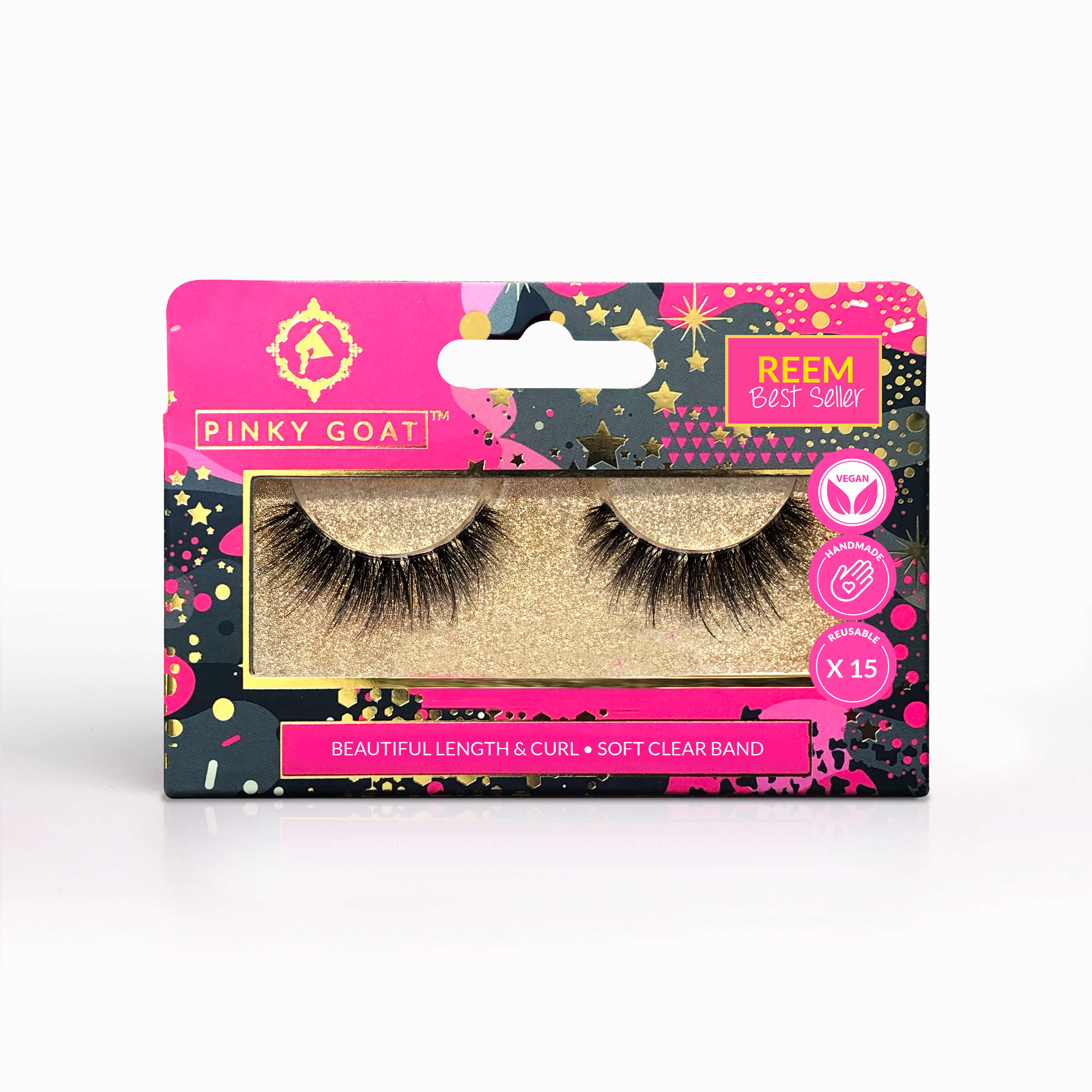

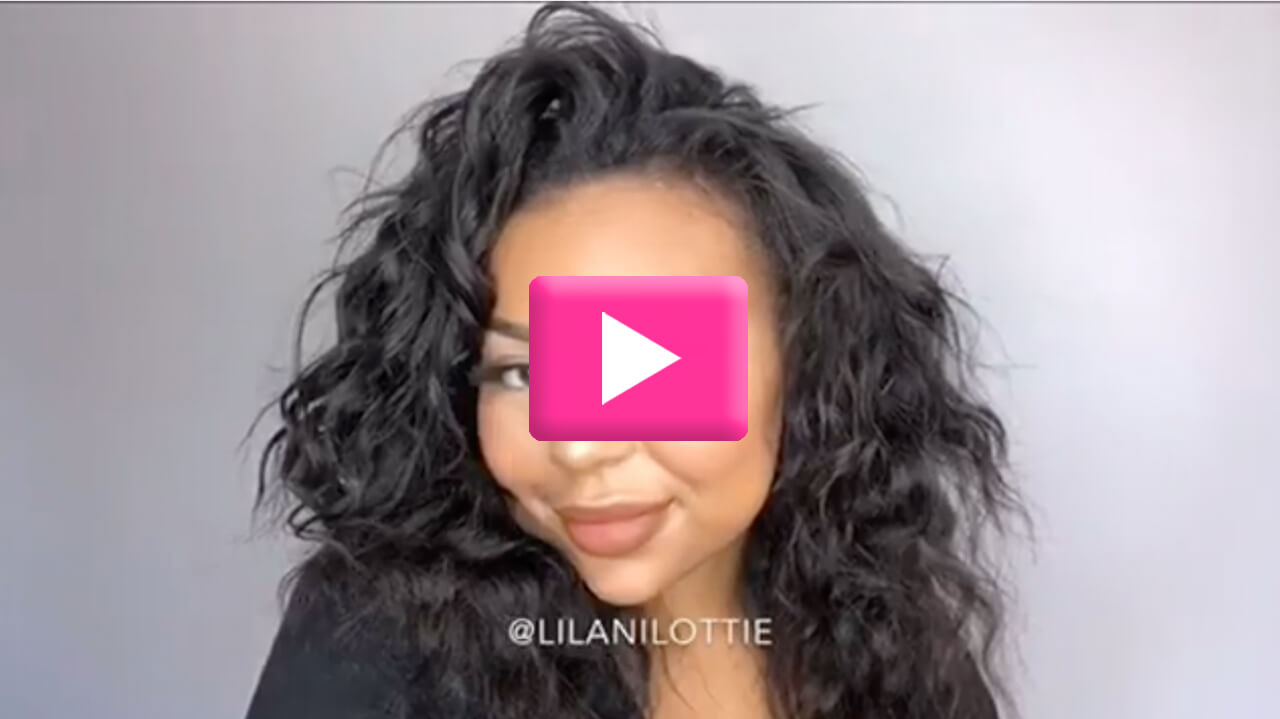
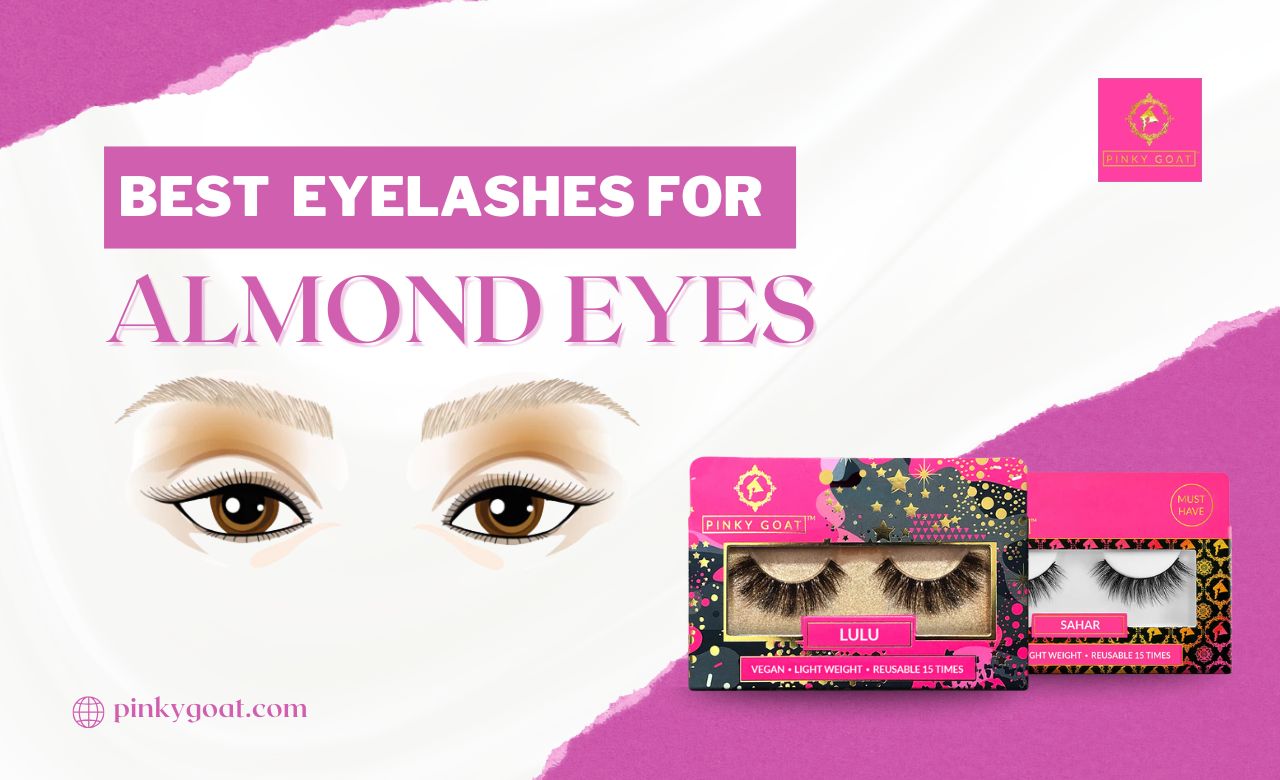
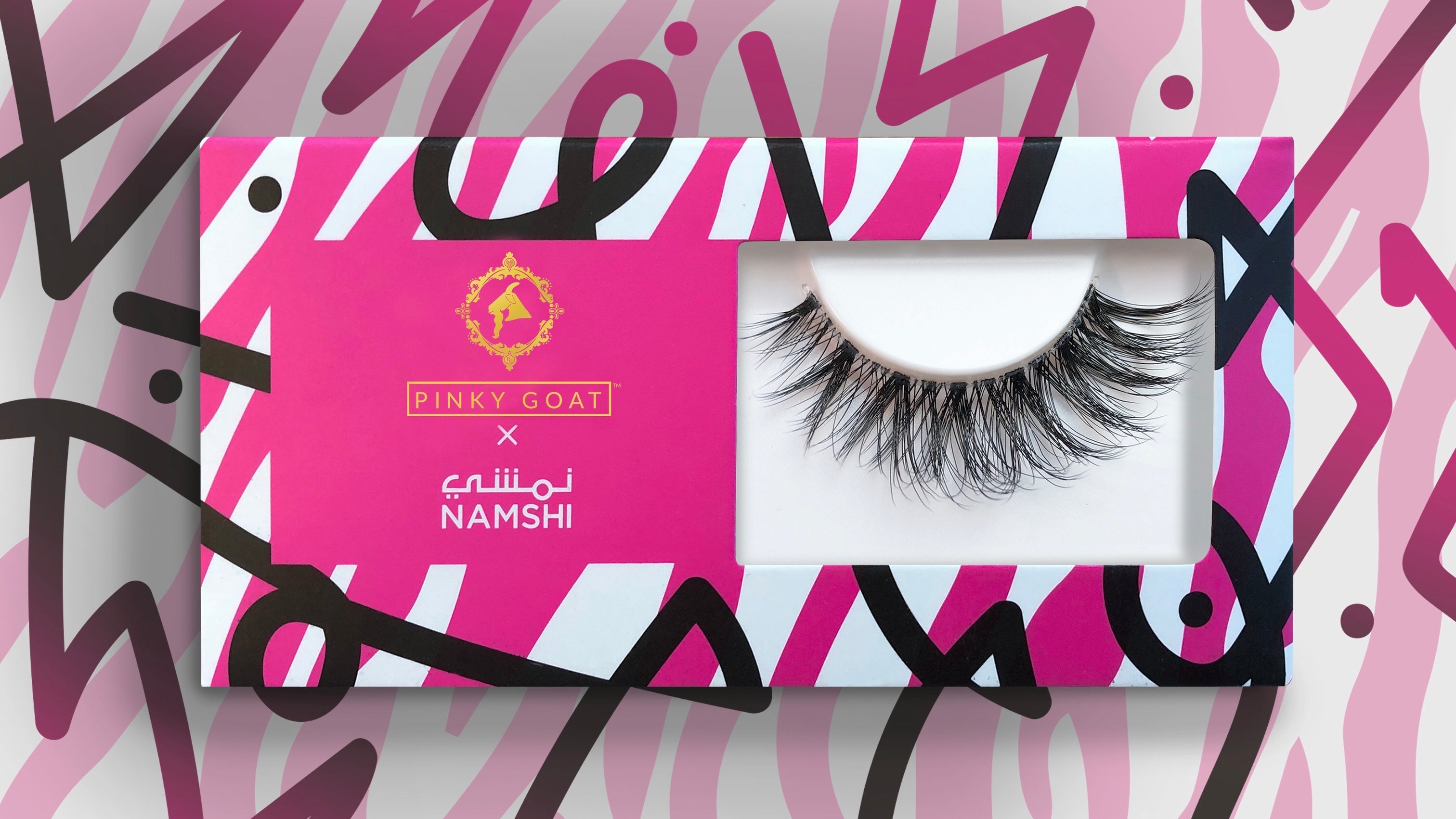
Comments